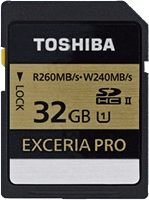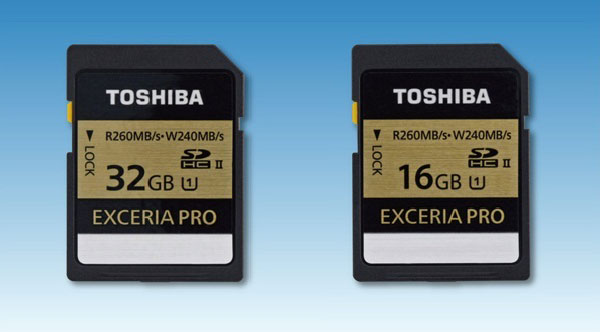Super-swift Toshiba flash cards promise 240MB/second write speeds, but what’s the catch?
posted Tuesday, July 16, 2013 at 2:04 PM EST

If you want to get the most out of your enthusiast or pro-grade interchangeable-lens camera, investing in a really fast flash card is a good idea. The faster your camera can offload data to the flash card, the sooner you can rattle off another burst of images after your buffer has been filled. (And if you're lucky, you might even get more images in the initial burst, as well.)
A new flash card line announced today by Toshiba promises industry-leading write performance that should not only make for a better burst shooting experience, but allow high-quality 4K video capture as well. The Toshiba Exceria Pro line has a claimed write speed of 240MB/second, but there's a catch.
To take advantage of all that speed, you'll need a camera compatible with the new UHS-II standard -- not to be confused with UHS-I, which is now fairly common in higher-end cameras. UHS-II was defined in the latest version of the Secure Digital card standard, and although it was first announced a couple of years ago, we're not aware of any UHS-II compliant camera models.

Still, the fact that UHS-II flash cards are finally arriving -- availability of Toshiba's Exceria Pro cards is slated for October 2013 -- suggests that could be about to change. Two capacities will be offered: 16GB, or 32GB. Although no pricing has been disclosed, we'd imagine the new cards will be pretty expensive, but Toshiba has simultaneously announced UHS-II compatible Exceria cards with 120MB/second write speeds.
While only half as fast at storing data, these standard Exceria UHS-II cards will offer the same 260MB/second read speeds as their faster-writing Pro siblings, so you'll be able to offload data to UHS-II compatible devices just as quickly with either card type. They'll also offer double the capacity: 32GB, or 64GB. Availability for the non-Pro variants is set at November 2013, and pricing hasn't been announced for these, either.